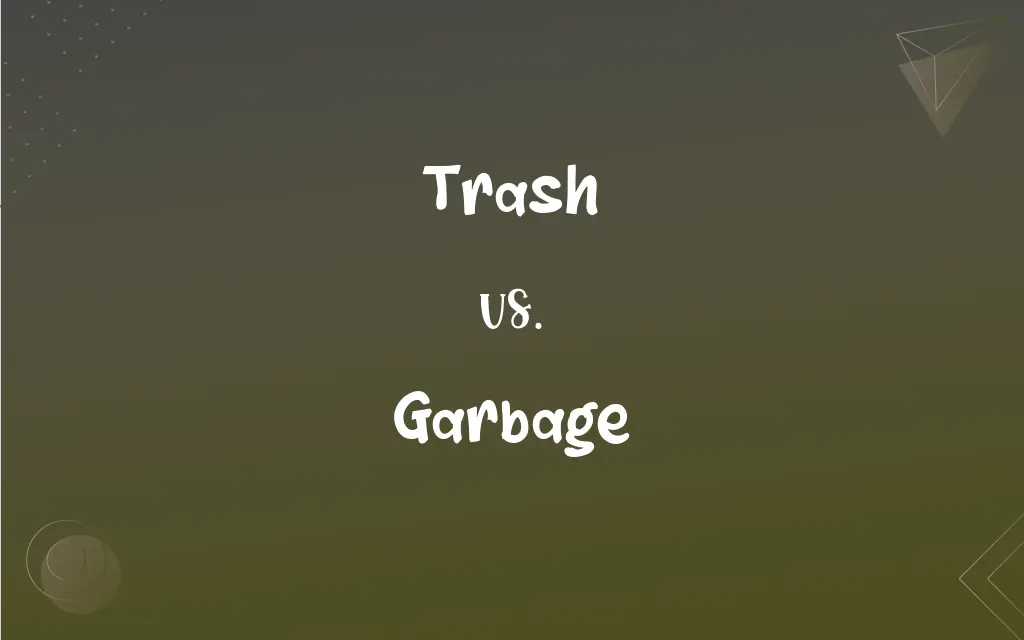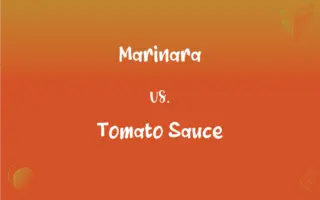Trash vs. Garbage: What's the Difference?
Edited by Janet White || By Harlon Moss || Updated on June 10, 2024
Trash generally refers to dry waste like paper and packaging, while garbage typically means organic waste, especially from food.

Key Differences
The terms "trash" and "garbage" are often used interchangeably, but they have distinct meanings. Trash primarily denotes discarded items that don't decompose quickly, such as paper, plastic, or metals. This means items that can be typically thrown out without much concern for immediate decay. On the other hand, garbage specifically points to waste that decomposes, especially organic waste. This includes remnants from food preparation, spoiled food, and other biodegradable materials. The presence of garbage usually necessitates more immediate disposal because of its tendency to rot and produce an unpleasant odor.
In everyday language, especially in American English, the distinction between trash and garbage can be blurred. Depending on the region or context, some might refer to all waste collectively as "trash" or "garbage" without making a clear distinction. This has led to the terms becoming almost synonymous in casual conversation.
In a more formal or technical setting, such as waste management, making a distinction between trash and garbage becomes crucial. Differentiating between the two helps in processing and disposing of waste more efficiently. For instance, trash might be sent for recycling, while garbage could be composted.
In conclusion, while trash and garbage can both signify waste, their inherent nature differentiates them. Trash usually points to dry, non-decomposing waste, while garbage refers to wet, organic, and decomposable waste.
Comparison Chart
Definition
Refers to dry waste
Refers to organic, decomposable waste
ADVERTISEMENT
Composition
Paper, plastic, metals
Food remnants, biodegradable materials
Decomposition Speed
Slow or non-decomposing
Decomposes quickly
Odor
Typically odorless
Can produce a foul odor when decomposed
Management Need
Recycling or landfill
Composting or landfill
Trash and Garbage Definitions
Trash
Trash refers to discarded items that aren't organically decomposable.
I threw the empty box in the trash can.
ADVERTISEMENT
Garbage
Garbage is primarily wet or moist waste.
Avoid mixing dry trash with wet garbage.
Trash
In casual terms, trash can mean any kind of rubbish.
Pick up your trash before you leave the beach.
Garbage
Garbage often requires more immediate disposal than trash.
The garbage should be taken out nightly to prevent pests.
Trash
Trash encompasses waste like paper, plastic, and metals.
Always separate your recyclable trash from other waste.
Garbage
Garbage refers to items that can quickly decompose and rot.
The kitchen garbage was full of vegetable peels.
Trash
Trash is often collected in bins or bags for disposal.
Ensure the trash bags are tightly sealed to prevent pests.
Garbage
Garbage typically means waste from food and other organic sources.
The garbage can needs emptying because it's starting to smell.
Trash
Trash can denote any disposable material, often dry.
The park was littered with trash after the event.
Garbage
Leftover food and biodegradable waste are examples of garbage.
She scraped her plate's leftovers into the garbage bin.
Trash
Worthless or discarded material or objects; refuse or rubbish.
Garbage
Food wastes, as from a kitchen.
FAQs
Is garbage the same as trash?
While often used interchangeably, garbage typically means organic, decomposable waste, especially from food.
Is paper considered trash or garbage?
Paper is typically considered trash as it's a dry waste.
What is trash?
Trash primarily refers to dry waste like paper, plastic, or metals.
Why does garbage smell bad?
Garbage contains organic matter that, when decomposed, can produce a foul odor.
Can trash be recycled?
Yes, many items classified as trash, like paper and certain plastics, can be recycled.
Can garbage be converted to energy?
Yes, certain methods can convert garbage, especially organic matter, into energy.
How can I reduce the amount of trash I produce?
Reduce consumption, reuse items, and recycle whenever possible to minimize trash.
Which is more harmful to the environment, trash or garbage?
Both can be harmful if not managed properly, but non-decomposing trash, especially plastics, poses long-term environmental challenges.
Can I throw food scraps in the trash?
Technically, food scraps are considered garbage, but they can be thrown in the trash if not separated.
Why is separating trash from garbage important?
Differentiating helps in efficient waste management, recycling, and composting processes.
What happens if I mix trash and garbage?
Mixing can make waste management less efficient and might hinder recycling or composting processes.
Can trash decompose?
While some trash might eventually decompose, it generally takes much longer than garbage.
What's the environmental impact of not separating trash and garbage?
Mixing can increase landfill waste, reduce recycling rates, and potentially release more greenhouse gases.
Do all cities differentiate between trash and garbage in waste collection?
Different cities have different waste management practices; not all might differentiate in collection.
Is it safe to burn garbage?
Burning garbage, especially plastics, can release toxic fumes. It's not recommended.
How do landfills manage trash and garbage?
Landfills often compact waste and cover it with soil, but some have separate areas or methods for organic garbage.
Can garbage be used for composting?
Yes, organic garbage like food scraps and yard waste can be composted.
Are all plastics considered trash?
Most plastics are trash as they're not organic, but some biodegradable plastics might be considered garbage.
How often should I dispose of garbage?
Due to its decomposable nature, garbage should be disposed of more frequently than trash.
Are leaves considered trash or garbage?
Leaves are organic and decompose, so they're typically categorized as garbage.
About Author
Written by
Harlon MossHarlon is a seasoned quality moderator and accomplished content writer for Difference Wiki. An alumnus of the prestigious University of California, he earned his degree in Computer Science. Leveraging his academic background, Harlon brings a meticulous and informed perspective to his work, ensuring content accuracy and excellence.
Edited by
Janet WhiteJanet White has been an esteemed writer and blogger for Difference Wiki. Holding a Master's degree in Science and Medical Journalism from the prestigious Boston University, she has consistently demonstrated her expertise and passion for her field. When she's not immersed in her work, Janet relishes her time exercising, delving into a good book, and cherishing moments with friends and family.































































